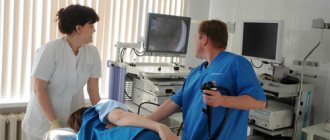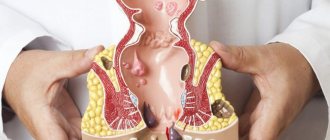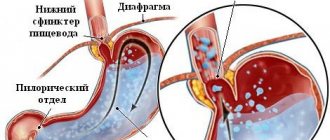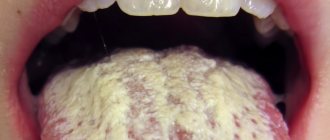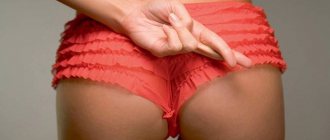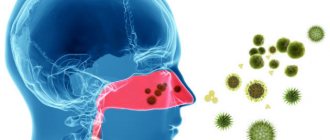In some cases, itching intensifies at night, interfering with sleep and rest. As a result, performance decreases, the patient becomes lethargic, irritable, depressed and apathetic.
In addition to itching and burning, the patient may experience other symptoms:
- redness of the skin;
- a change in the density of the skin near the anus - its thinning or, conversely, thickening;
- the appearance of rashes, weeping ulcers, eczema.
What is itching in the anus?
Itching is a painful, tickling sensation in the skin that causes an obsessive desire to scratch the affected area. Itching often occurs due to irritation of the skin near the anus. For example, with idiopathic itching, there is increased production of mucus by the intestinal walls. Fluid is constantly released from the anus, causing inflammation and redness of the surrounding tissues. This is what causes discomfort. But other reasons also lead to inflammation.
For example, with enterobiasis, painful itching occurs due to the movement of small parasitic worms - pinworms. The burning sensation intensifies in the dark, when the helminths move closer to the anus. This irritates the nerve endings, which causes an itchy burning sensation. But these are not all the factors due to which this pathological condition can develop.
Helminth infection
This is also one of the main reasons for the feeling of itching and discomfort in the anus. Parasites located in the intestines, most often pinworms, mainly lay their eggs in the anus area at night, read more. Which causes discomfort. Ascariasis and infection with other helminths causes itching and burning after bowel movements.
What causes itching in the anus?
Anal itching is not always caused by pathological processes occurring in the body.
It may also be associated with external influences:
- using hard toilet paper that injures the skin;
- excessive or insufficient intimate hygiene;
- working in a room with dusty air.
Unsuitable soap or allergies to cosmetic fragrances also lead to skin irritation and can cause burning and itching.
Irritation of the anal area is caused by a variety of diseases:
- parasitic infestations;
- inflammation of hemorrhoids;
- fungal infections;
- genitourinary infections;
- neoplasms;
- insufficient function of the anal sphincter;
- diabetes mellitus and other severe chronic diseases.
In many cases, an unpleasant symptom occurs due to diseases of the rectum. Their spectrum is quite wide: skin neoplasms, chronic proctosigmoiditis, and dysbacteriosis can cause a burning sensation. Other symptoms gradually appear: for example, pain and pain during bowel movements, bloody and mucous clots in the stool, a feeling of pressure and heaviness in the lower abdomen. But the main symptom remains irritation and redness of the skin.
In women, itching may be associated with certain gynecological diseases. At the same time, it radiates not only to the anal area, but also spreads to the labia majora, labia minora, and vulva. The perineum becomes red and swollen, and copious discharge with an unpleasant odor appears.
The causes of burning are varied, so if it occurs, it is recommended to contact a medical center for examination by a proctologist.
Infectious diseases of the genitourinary system
Due to gynecological pathologies, itching may develop in the perineum and anus. In addition to these pathologies, there are also diseases that cause similar unpleasant symptoms. If a woman suffers from gonorrhea, trichomoniasis, or chlamydia, she may be bothered by various unpleasant moments. Including discomfort in the genital area. The most harmless of all these diseases is thrush, but it also brings a lot of trouble and negative consequences. A woman infected with pubic lice has an itchy entire perineum and the area around it.
Itching around the anus
Skin lesions near the anus are associated with exposure to external and internal factors. The first includes:
- increased sweating. More often observed in people with excess body weight. Sweat begins to accumulate in the perineal area, irritating the skin. As a result, diaper rash appears, which serves as a source of discomfort;
- wearing tight synthetic underwear. Linen fabric disrupts natural air exchange and prevents normal moisture removal. Rough internal seams violate the integrity of the skin and impair blood microcirculation. All this creates favorable conditions for the development of pathogens.
If the irritation is caused by external causes, curing it is quite simple. The patient is advised to give up synthetic detergents (or choose hypoallergenic cosmetics tested by dermatologists) and choose natural, loose underwear with a comfortable cut.
Conditions associated with internal pathologies are more difficult to treat. For example, itching is the main symptom of dermatitis and psoriasis, lichen, and eczema. Dysbacteriosis and diarrhea can cause a burning sensation. Too frequent bowel movements have a negative impact on the condition of the mucous membrane: blood rushes to it, the tissues swell, become more sensitive - any touch is accompanied by pain. But there are also more serious reasons that disrupt the functioning of the sphincter.
For example, chronic metabolic disorders lead to the accumulation of toxins in tissue cells. As a result, the patient develops skin rashes that extend to the perineum. Therefore, itching accompanies diabetes mellitus, cirrhosis and liver tumors, and pancreatic pathologies.
The main causes of itching in women
Often, itching around the anus occurs due to insufficient hygiene. As a result of the development of pathogenic microflora and insufficient cleansing of the skin, diaper rash may develop. Tight or synthetic underwear can also cause skin irritation. When diaper rash occurs, it is enough to follow the necessary hygiene standards; sometimes you can use an anti-inflammatory cream or powder.
But there are also situations where severe itching may indicate more serious problems in the body. Next, we will try to find out what are the main causes of itching? So, the following diseases can provoke discomfort:
- Internal hemorrhoids - they are characterized by dilation of the veins of the rectum and the formation of nodes. The disease begins unnoticed, since it is impossible to see changes in blood vessels. The disease is provoked by poor nutrition, irrational physical activity, childbirth;
- External hemorrhoids are a continuation of the internal ones. Hemorrhoids fall out during or without defecation, causing pain, itching, and bleeding.
- Infestation with parasites. The most common infestations are caused by pinworms, which is especially common in children and adolescents. When the baby sleeps, female pinworms lay eggs in the area around the anus, which causes discomfort and itching in the anus. The cause of the burning sensation is also explained by the presence of ascariasis and infection with other types of helminths, and this symptom most often occurs after bowel movement. Giardiasis can also cause itching, since when these parasites multiply massively, children and adults experience diarrhea with intense cramping pain in the abdomen, and with frequent bowel movements, irritation of the anus also leads to itching. With giardiasis, the possibility of a rash occurring on various parts of the body, including in the perineal area, is also a source of itching.
- Dysbacteriosis. Numerous diseases of the gastrointestinal tract, namely dysbiosis, deserve special attention. Any intestinal infection (dysentery, salmonellosis), or prolonged and uncontrolled use of antibiotics can provoke the development of dysbiosis. The human intestinal microflora is replaced by opportunistic microflora, which leads to the development of diarrhea and/or constipation. The anal mucosa is constantly injured and severe itching and burning occurs. The use of a complex of drugs containing lacto- and colibacteria, adherence to a certain diet, as well as strict adherence to all doctor’s recommendations help to cope with the situation.
- Allergy. The reasons why itching in the sphincter area may occur due to allergies to toilet paper, bedding, personal care products or food dyes. Also, these factors can provoke redness, burning and contribute to the appearance of microcracks in the sphincter area.
- Gynecological diseases. Another cause of itching in the anal canal in women is various infectious diseases of the genitourinary system. Any STI, gonorrhea, trichomoniasis, chlamydia can cause any discomfort in the groin, itching, burning, pain. The most common and most harmless cause of itching of the anus is thrush in women, since the vagina is located next to the rectum, and fungal infections can spread to this area. Vaginal candidiasis is quite easy to treat and does not present serious difficulties in diagnosis, unlike other hidden infections and gynecological diseases. Sometimes the presence of pubic lice contributes to the appearance of itching throughout the perineum.
Another complaint of anal itching may occur against the background of mental and neurological disorders:
- for depression and neuroses;
- with obsessive-compulsive disorder with an obsessive desire to frequently wash various parts of the body (including the perineum);
- with dermatozoan delirium, when a person considers himself infected with insects or worms crawling under the skin;
- in case of violation of surface sensitivity due to diseases of the spine and spinal cord.
Itching due to skin irritation is associated with rough toilet paper, synthetic underwear, allergies to washing powder and detergents. Identifying the true cause of anal itching will help you choose the right treatment. And the solution to such a delicate problem should be entrusted to doctors, and not to self-medicate.
Which doctor treats itching in the anus?
If the anal area becomes red and itchy, you should make an appointment with a proctologist. The specialist will listen to complaints, clarify family history, and conduct an initial examination. But to make an accurate diagnosis, examinations will be required, the range of which will be determined by the doctor.
Typically studies include:
- blood and urine tests;
- irrigoscopy;
- colonoscopy;
- sigmoidoscopy;
- anoscopy and other intestinal examinations.
In some cases, consultations with other doctors are required: a urologist or gynecologist, endocrinologist, dermatovenerologist. Referrals to them are given by a proctologist. Based on the results of the tests, the disease causing irritation in the anal area is determined, and the appropriate treatment is selected.
Possible causes of itching near the anus
Depending on the reasons for the development of itching near the anus, this pathological symptom will manifest itself in different ways, and differ in duration, intensity, time of occurrence, etc. Accordingly, doctors distinguish two main types of itching sensations:
- primary, which occurs without specific pathological causes;
- secondary, in the development of which the main culprit is a disease already existing in the body of a sick person.
So, it is secondary itching near the anus that is dangerous to human health. It may be one of the first signals about the development of severe pathological conditions in the human body, accompanied by dysfunction of internal organs and the formation of persistent changes in their normal structure. Only a qualified specialist can determine why a patient itches near the anus after a thorough diagnosis and examination.
Haemorrhoids
As a rule, most often pathological itching near the anus appears with enlarged hemorrhoids. Such unpleasant sensations are often preceded by a strong burning sensation and the appearance of bloody discharge at the end of a bowel movement. Why does the skin itch with hemorrhoids? This happens for several reasons:
- due to increased sensitivity of the skin and mucous membranes to irritating factors;
- as a symptom of the inflammatory process, which is associated with the prolapse of hemorrhoids;
- as a result of the interaction of irritated tissues and mucus secreted from the posterior opening.
Anal fissure
When cracks form in the anus, patients often complain that they are itching near the anus. Although this is not the most important symptom of the disease. Itching in the anal area can occur in the later stages of the development of the problem, and at first people note severe pain that accompanies every trip to the toilet.
Helminthiasis
Intestinal parasites or helminths, which live mainly in the distal parts of the intestine, during their life processes secrete metabolic products that irritate the skin around the anus. This is the main reason for the appearance of itching near the anus in men and women whose bodies are affected by worms. Since intestinal parasites are more active at night, the itching sensation becomes worse during this period.
Diabetes
During hyperglycemia, glucose is released through the pores on the human skin, which causes local irritation and itching. Also, the development of an unpleasant symptom in the anal area is facilitated by the addition of an infection with the formation of inflammation.
Pathological conditions of the liver
With liver diseases, certain enzymes enter the bloodstream, which cause symptoms of intoxication and severe generalized itching. Therefore, with pathologies of this class, not only certain areas itch, but the whole body.
Skin ailments
Itching in the anus can occur with some skin pathologies, namely: dermatitis, allergic reactions, skin mycoses, and the like. Due to the fact that for effective treatment it is necessary to establish the exact cause of the disease, if itching with redness occurs, you should definitely visit a dermatologist.
Mental illness
It has been proven that when the psycho-emotional background is disrupted, the sensitivity of a sick person changes, and the parasympathetic nervous system is activated. Such processes cause the development of itching near the anus in women and representatives of the stronger sex, which is eliminated only after taking sedatives.
Overweight
Itching and redness around the anus is one of the common manifestations of a person’s sudden weight gain. As a result of what is happening in the patient, the area of skin surfaces that come into contact with each other increases, creating suitable conditions for the appearance of diaper rash. In turn, this gives rise to the development of itchy skin around the anus and itching sensations directly inside it.
Allergic reactions
Allergy is a pathological condition that is accompanied by itching. It often appears as a result of skin contact with potential allergens, in particular, synthetic fabrics from which underwear and bed linen are made, lubricants, and intimate toys.
Intestinal dysbiosis
As you know, dysbacteriosis often causes diarrhea and constipation, which causes itching around the anus.
Why does the anus hurt?
In some patients, the itching turns into aching or cutting pain in the anal area. The attacks differ in duration and intensity, radiating to the lower abdomen, lower back, and lower spine. The severity of the pain syndrome and its specificity are determined by the pathological disorder that led to the appearance of pain.
Doctors can diagnose:
- anal fissure. It is usually diagnosed after mechanical trauma to the sphincter and surrounding tissues - for example, during difficult childbirth or after an accident. The mucous membrane “cracks” and exposes the muscles, which leads to severe pain. Painful spasms occur when visiting the toilet, performing hygiene procedures, or touching the affected area;
- anorectal fistula. A fistula is a pathological channel between the intestines and the skin of the buttocks. The fistula itself is usually painless, but mucus and other waste products are constantly released from it, which leads to constant irritation of the surrounding tissues. The skin becomes inflamed, swollen, red and itchy;
- haemorrhoids. A common cause of pain and heaviness in the anal area. With hemorrhoids, the hemorrhoidal nodes located next to the sphincter become inflamed. If the nodes are slightly enlarged (the disease is at the initial stage), then the patient experiences discomfort only when bowel movements. But as the pathology progresses, acute pain appears with any touch to the tailbone area - it becomes impossible to sit. Other symptoms of hemorrhoids include: bleeding from the anus, the appearance of cracks in the mucous membrane;
- chronic proctosigmoiditis. This is the name for inflammation of the lower intestine, which occurs with clearly defined periods of remission. During periods of exacerbation, the patient's temperature rises, a sensation of a foreign body in the anus and severe itching pain;
- intestinal tumors. The appearance of neoplasms in the gastrointestinal tract is also accompanied by pain and burning. The closer the tumor is to the anus, the more pronounced discomfort the person will experience.
Constipation (due to hardening of stool, creating pressure on the intestinal walls) or diarrhea can lead to pain in the anus. Often severe pain occurs due to impaired blood flow in the gluteal muscles, for example, from a prolonged forced sitting position. Truckers or people, freight forwarders encounter this manifestation. The exact cause can only be determined after an examination.
If treatment is not started, the disease worsens and other signs of pathologies gradually develop:
- fever;
- discharge from the anus;
- mucus in stool;
- dysfunction of the gastrointestinal tract;
- pain in the abdominal area.
The patient loses his appetite, experiences nausea after eating, and his weight changes dramatically. The skin becomes pale, moist, with a grayish tint. If such signs appear, it is recommended to make an appointment with a doctor as soon as possible. Pain and burning in the anus may indicate a serious pathology that requires immediate treatment.
Causes of anal itching
The source of itching in the anus is irritation of the anus. But the primary source that caused irritation can be a variety of diseases. Therefore, before starting treatment, it is necessary to identify the factors that provoke this itching.
It is possible to distinguish the external and internal roots of unbearable rectal itching. In addition, proctologists divide the itching itself in the anus into two types:
- Primary. This is true itching and is not a symptom of any disease. Most often, itching of the anus is caused by poor hygiene, poor diet, allergies to medications or underwear, etc.
- Secondary. This type of burning cannot be called an illness, since it is precisely a manifestation of a specific disease. Most of all, such itching can appear from the presence of helminthic infestations, hemorrhoids, proctitis, venereal diseases, anal fissures and other diseases.
Common sources of rectal itching:
- Worms (pinworms).
- Bacterial and fungal infections.
- Anal fissures.
- Fistulas, hemorrhoids.
- Human papillomavirus infection (warts, condylomas concentrated in the anus).
- Intestinal diseases (dysbiosis, ulcers, gastritis, colitis, intestinal polyposis).
- Oncological pathologies.
- Liver diseases.
- Disorders of the pancreas.
- Allergic dermatitis.
- Diabetes.
- Intoxication with various poisons.
- Treatment with antibiotics or erythromycin.
- Neglect of hygiene standards.
- Psychological abnormalities (stress, neuroses).
- Obesity.
The true root of rectal itching is determined by the attending physician after questioning, examination and testing.
In many cases, treating anal itching with folk remedies helps. These are absolutely safe drugs that cannot cause side effects.
They effectively relieve itching in the anus, but, of course, cannot treat diabetes and are unlikely to cure the liver.
Therefore, they are recommended to be used as additional therapy, and the source of the unacceptable symptom itself should be treated according to the course prescribed by the attending physician.
Any folk remedy for itching in the anus is based on medicinal plants that have soothing, anti-inflammatory, drying, antipruritic and healing properties. Such plants include mint, chamomile, calendula, burdock roots, oak bark and others.
Home treatment for rectal itching mainly consists of the following:
- Using homemade ointments.
- Use of various decoctions.
- Preparation of various herbal decoctions for baths and enema procedures.
- Use of lotions and compresses.
- Preparation of candles and their use.
There are many reliable folk remedies that eliminate itching around the anus:
- When hygiene is the root of the burning sensation, there is no need to buy or make any medicine. You just need to take good care of yourself and take hygienic measures after each bowel movement. In addition, it is recommended to replace toilet paper with antibacterial wet wipes.
- If you are obese, it is naturally important to start fighting excess weight: go on a diet, do fitness, and completely change your diet. If you have allergic dermatitis, you should stop wearing synthetic underwear, as it further irritates the skin.
- For fungal diseases, various ointments are used. For infestations, doctors prescribe antihelminthic drugs.
- You need to take it more seriously when you detect hemorrhoids. For this disease, treatment is prescribed by a proctologist. He determines the drugs and the scheme of their use depending on the type and stage of the disease. The condition can be alleviated by wiping and applying compresses with Menovazin liquid.
- A specialized specialist should treat and diagnose internal diseases.
- You can relieve itching in the anus with 3% hydrogen peroxide. To do this, you need to soak a cotton pad in it and gently wipe the sore spot with it.
- Regular washing with boiled water and laundry soap can soothe irritated skin. In this case, the soap should be applied to the skin around the anus and it is advisable to hold for 5 minutes, then rinse thoroughly.
- If pinworms are detected in children, microenemas should be used. Enemas with milk and garlic are excellent for itching. To do this, you need to boil 50 ml of milk and add garlic juice squeezed from one clove. This enema must be held for up to 15 minutes, holding the baby’s buttocks. After the procedure, the skin around the child’s anus must be washed with baby soap, then rinsed with boiled water and dried with a soft, exclusively clean cloth.
- Throughout the restless period, it is advisable not to wear underwear at night and completely exclude thongs from wearing.
Folk recipes
Since it is not always possible to rid yourself of itching in the anus at home with washings and enemas alone, you should pay attention to easy folk recipes for antipruritic ointments and decoctions.
Sitz baths:
- You will need oak bark or calendula, chamomile, string or birch buds.
- Pour a liter of boiling water over 3 tbsp. oak bark, let the decoction brew.
- Fill a bowl with the broth and sit in it for half an hour.
- Next time, the decoction should be made from another plant, and it is advisable to alternate baths with decoctions. You can do without this, make baths exclusively on oak bark.
Enemas in the treatment of itching:
- You will need dried calendula flowers and sea buckthorn oil.
- Prepare calendula infusion. For this you need 1 tbsp. Throw the flowers into 100 ml of boiling water. The broth is removed from the heat after it has boiled. Leave for 1 hour.
- 2 tsp Sea buckthorn is added to the cooled broth.
- Use the infusion as a microenema at night.
We suggest you familiarize yourself with Chicory for varicose veins - why a doctor can’t tell you
Lotions to treat itching:
- You will need marigolds and olive oil.
- Pour 100 grams of marigolds into a jar of olive oil (500 ml jar). The mixture is placed in a warm place.
- In an oil-herbal infusion, moisten a bandage or cotton pad and apply to the irritated area of skin for 30 minutes.
Antipruritic ointment with Vaseline:
- You will need Vaseline and cranberry juice.
- Pour 50 ml of juice into 200 grams of Vaseline. Stir until a homogeneous mass is formed
- Apply the prepared mixture around the anus 2 times a day every day.
Creamy oat antipruritic ointment:
- You will need oat grains and butter.
- Oat grains are first roasted and then ground into powder.
- The resulting powder must be mixed with unsalted butter (1:2).
- A homogeneous mass is smeared in the anal area 2 times a day.
Antipruritic suppositories for anal fissures:
- You will need badger fat, propolis, medical alcohol, potatoes.
- All ingredients, taken in equal proportions, must be combined and mixed thoroughly. The resulting mixture should be hidden in a cold place for three days.
- After three days, cut candles from raw potatoes and dip them in the medicinal mixture. After which the suppository is inserted into the anus for 15 minutes.
If attempts to get rid of rectal itching at home are unsuccessful, you should quickly rush to the doctor. An unknown disease that causes itching in the anus can lead to more tragic consequences if it is not treated in time. You should pay attention to any changes in your body and always welcome the rules of personal hygiene
Obsessive itching in the anal canal is a symptom that is rarely addressed to a doctor. It is considered inconvenient, sometimes indecent, and is often ignored. Meanwhile, itching near the anus or inside it does not occur for no reason. It may hide a serious intestinal or rectal disease, endocrine disorders and parasites.
To say goodbye to unbearable itching in an “inconvenient place” once and for all, you need to find out the reasons for its occurrence, and then select effective treatment methods.
It is very simple to distinguish pathological itching in the anal area from short-term irritation of the perianal area. Pathological is considered a symptom that occurs, if not constantly, then regularly. The majority of patients who sought medical help complaining of daily discomfort associated with certain situations:
- eating;
- eating certain foods;
- going to the toilet;
- body position;
- human activity.
Anal itching can occur for no apparent reason. However, it causes significant inconvenience and reduces the patient’s quality of life. An attack of severe itching can last from several minutes to several hours.
Pathological itching does not go away on its own, becomes longer and more intense, and in most cases is complicated by inflammation of the skin around the anus. In this case, itching and burning, tingling and swelling of the anal folds become a constant companion for the patient.
Additional symptoms that accompany itching in the anus indicate pathological processes:
- discharge of mucus from the anus;
- anal bleeding (traces of blood visible on stool and/or paper);
- sensation of a foreign object in the anus;
- intestinal disorders (diarrhea, flatulence, constipation);
- rashes in the perineum;
- acute pain during bowel movements;
- discharge from the genital tract.
All of these conditions require proper treatment. However, before you start, you need to find out what exactly caused the itching.
Without knowing the reasons why the anus itches and burns, it is impossible to select effective treatment methods. If you pay attention only to eliminating this symptom, the disease will progress.
If you have complaints about anal itching, you can contact your doctor. After an initial examination, he will refer the patient to a specialist - a proctologist, gastroenterologist, infectious disease specialist, urologist or gynecologist. The patient may have to consult several specialists and undergo several tests.
At the initial stage of diagnosis, the doctor will consider specific symptoms, based on which it can be assumed that as a result of itching in the anal area. There are several dozen diseases with this symptom.
The most common cause of itching in the anus in adults is diseases of the rectum. These include:
- external or internal hemorrhoids;
- chronic proctosigmoiditis;
- neoplasms in the rectum (polyps or cancerous tumors);
- neoplasms in the folds of the anus and around the anus (genital warts);
- anal fissures;
- anorectal fistulas.
Sharp pain in the lower abdomen, radiating to the anus
Quite often, women encounter this type of pain in the middle of the menstrual cycle. The pain occurs due to the rupture of the follicle when the egg is released. The process is accompanied by a local increase in temperature in the ovaries, which further aggravates the discomfort. But these are natural processes that do not cause concern.
Similar pain occurs during menstruation. It can be very pronounced and quite long (up to two days). You should not take painkillers or hormonal medications on your own - it is better to contact a supervising gynecologist to prescribe antispasmodics.
But pain in the lower abdomen may also indicate pathologies:
- inflammation and accumulation of fluid in the retrouterine area;
- adhesions affecting the reproductive organs;
- ovarian cyst;
- ectopic pregnancy.
If sharp pain occurs in men, it may be caused by inflammation of the appendix. Along with the pain, nausea, general weakness, and heart rhythm disturbances occur. But sometimes painful sensations in the abdomen are caused by ordinary constipation and flatulence. However, if a person regularly experiences indigestion or suffers from regular constipation, this may be a sign of a serious pathology. It is worth making an appointment with a gastroenterologist or proctologist.
Other reasons
The pain is sometimes severe.
Patients who are overweight often sweat, which causes macerations and chafing on the body.
Burning sensation, pain, and discomfort are constantly present. Using baby powder will improve the condition slightly, but will not cure it completely. In this case, you need to lose weight.
There are also neurogenic causes, in particular, obsessive-compulsive disorder. The patient is nervous all the time, worries for no reason, and constantly wants to swim. Because of this, frequent visits to the bathroom lead to the washing away of the natural protective film on the body.
After a certain time, skin itching begins to torment, which is also felt in the perineal area, which again sends the person to the bathroom. In such a situation, it is worth asking your doctor about treatment options.
About itching in the anus, watch the video:
Read along with this article:
- What to do if itching in the anus
- The first signs of hemorrhoids do not always attract attention
- Papillitis is a disease that you shouldn’t remain silent about...
- Bacterial infection: symptoms, causes of development and methods...
- Why does pain occur in the anus?
- What does the intestinal tumor marker show: what are tumor markers?
- Is it possible to drink milk if you have gastritis with high acidity?
- Proctologist: what he does, what diseases he treats and how...
- How does chronic pancreatitis manifest itself, how to cure it
Why does pain radiate to the anus during pregnancy?
Pregnant women periodically experience unpleasant pain radiating to the anal sphincter area. Discomfort is caused by a number of factors:
- Fetal growth leads to increased pressure on the intestines. Internal organs become compressed, blood flow to them deteriorates and metabolic processes slow down. To compensate for this effect, the veins swell and expand, which gradually worsens the elasticity of the intestinal walls and leads to the formation of hemorrhagic nodes;
- in the last trimester, the organs of the peritoneum are compressed and displaced, experiencing a lack of nutrients. This affects their functioning - in particular, pregnant women may suffer from constipation or diarrhea, which is also accompanied by painful sensations in the anus;
- During pregnancy, the body's immune defense decreases and inflammatory processes worsen, pathogenic microflora activates, and dysbacteriosis often develops.
Fetal growth also affects intestinal motor functions. Peristalsis worsens, which leads to frequent constipation. The situation is aggravated due to the woman’s low mobility in the last stages of pregnancy. To avoid problems with the gastrointestinal tract, it is recommended to balance your diet, and if unpleasant symptoms recur, consult an experienced doctor.
When pain occurs at 8-9 months of pregnancy, it may indicate the onset of labor or “false contractions.” Therefore, the appearance of the slightest discomfort cannot be ignored - this can negatively affect the health of the mother and her unborn child.
How to get rid of itching in the anus?
If itching and burning appears in the anal area, you need to make sure that it is not caused by external factors. Perhaps you recently changed your intimate hygiene product and the itching is caused by an allergic reaction.
In this case it is necessary:
- remove cosmetic residues from the skin;
- wear loose, comfortable-shaped underwear made of cotton, silk or other natural materials;
- choose soft, fragrance-free toilet paper.
By eliminating the external irritant, you will get rid of the itching. But if, in addition to irritation, you find symptoms such as:
- rashes on the buttocks;
- the appearance of condylomas;
- weeping sores.
In this case, it is recommended to seek advice from a proctologist or dermatovenerologist as soon as possible. Most likely, the patient has a skin infection caused by a bacteria, virus, or fungus. The doctor will prescribe the necessary tests to detect the pathogen and select the appropriate treatment.
If independent attempts to cope with the itching do not bring results for more than a day, the burning and stinging intensifies, or new symptoms of disorders appear, you should not self-medicate. Many diseases can cause discomfort in the anal area, and the sooner they are detected, the higher the likelihood of a quick recovery without complications.
Prevention of the problem
Skin problems associated with the occurrence of itching sensations inside the anus and in the immediate vicinity of it almost always indicate the development of some pathological process in the body. That is why experts advise, when the first alarming symptoms appear, to consult a proctologist. Timely treatment will help prevent the disease from starting and prevent its progression. Compliance with the following hygiene rules undoubtedly helps in carrying out therapeutic measures:
- the anus and perineum area must be washed with cool water after each bowel movement;
- underwear should not only be loose, but also made from natural fabrics;
- a constant fight against constipation is necessary, which can be effectively helped by the habit of bowel movements at the same time;
- When carrying out daily hygiene procedures, hypoallergenic soap should be used.
It is also necessary to remember that the use of newsprint after defecation is strictly not recommended, since the chemical compounds contained in printing ink are dangerous for the delicate skin of the anus.
Correcting your diet will help prevent perianal itching. The daily menu should minimize the content of hot herbs and spices, fatty, fried and sweet foods, as well as carbonated drinks. Chocolate, citrus fruits and any alcoholic beverages are completely prohibited.
Only compliance with the above preventive measures will help not only to effectively cope with a delicate problem, but also to prevent its reoccurrence. In no case should we forget that the delicate problem of itching in the anus is very serious. You should not ignore her therapy, or allow violations in the treatment complex prescribed by a specialist, as this can be fraught with the occurrence of complications that are practically untreatable.
How to treat itching in the anus?
The treatment regimen depends on the diagnosed disease. If the itching is caused by parasitic infestation, anthelmintic drugs are prescribed. In case of contact dermatitis, the doctor prescribes antihistamine tablets and topical ointments.
Typically, complex treatment is carried out, which may include:
- physiotherapy. They improve blood circulation in tissues, promote rapid healing and normalization of the rectum. Reduce the severity of pain and help alleviate the patient’s condition;
- taking antiviral and antimicrobial drugs. Prescribed if pain and itching are caused by pathogenic microorganisms. Targets the pathogen;
- painkillers. For intense pain, novocaine blockades are prescribed.
Medicines and procedures are selected depending on the diagnosed disease, the patient’s current state of health, and the characteristics of his body. The proctologist monitors the progress of treatment until the patient recovers completely.
Causes
Factors influencing the appearance of burning sensation, itching and other associated symptoms can be very different. They can be divided into 2 categories: external causes, which do not pose a danger and can be easily eliminated, and more serious pathologies of the intestines or genital area.
External causes that can cause discomfort:
- Insufficient hygiene.
- Excessive hygiene.
- Allergic reactions.
- Shaving the anal area.
- Excess of spicy seasonings.
- burning in the anus,
- painful sensations,
- bloody issues.
The simplest and most common reason. Consists of rare toilet procedures using mild soap and warm water. Also, burning and itching may appear after bowel movement as a result of poor treatment of the anal area with toilet paper. Infrequent changes of linen aggravate the situation. Poor hygiene also promotes the growth of pathogens, which can lead to more serious complications and diaper rash.
Constant washing, especially in combination with the use of powerful antibacterial detergents, can dry out the mucous membrane and destroy the beneficial microflora that protects the anal area from pathological bacteria. The result of this may be the development of candidiasis.
The sudden onset of negative feelings may be due to a reaction to a new allergen. These can be synthetic fabrics of underwear, cosmetics, fragrances in toilet paper or wet wipes, and exotic products. Also, external preparations for the treatment of gastrointestinal diseases (suppositories, ointments) can cause allergies.
Sometimes itching can also result from this cause due to the shaved hairs growing into the skin or the irritation of the short growing parts on the surrounding areas. During shaving, too intense irritation of delicate areas of the skin and microscopic injuries occur, which in itself becomes a cause for discomfort.
The symptom is especially often caused by sauces and seasonings based on hot red pepper, which have an intense irritant effect on the mucous membranes. Depending on their strength, the burning sensation may intensify.
If the absence of concomitant diseases is confirmed, possible causes should be analyzed: lifestyle, nutrition and the influence of provoking factors should be excluded.
Haemorrhoids
Hemorrhoids are pathological changes in the cavernous bodies of the vessels of the intestinal walls. The condition begins to develop unnoticed for a number of reasons; symptoms most often appear towards the end of the 2nd – beginning of the 3rd stage of the disease. The first signs may be accidentally discovered during anoscopic examinations.
Main symptoms of hemorrhoids:
Symptoms usually worsen during and after defecation due to the traumatic effect of feces on painful areas. As hemorrhoids develop, voluminous lumps form; over time, they reach impressive sizes and cannot be pushed back into the intestinal cavity. This stage is accompanied by intense pain.
Hemorrhoids are accompanied by severe pain
Sometimes, against this background, the patient develops a fear of going to the toilet, which contributes to the development of constipation and further deterioration of the condition. When hemorrhoids progress to stage 4, conservative treatment is often ineffective, which becomes the reason for the need for surgical methods of removing hemorrhoids.
Anal fissures
The appearance of a crack can be a consequence of hemorrhoids, but most often the injury is caused by excessive straining during bowel movements due to the high density of stool. The condition develops due to chronic constipation. Burning and itching appear as symptoms of physiological healing of injured tissue.
Anal fissure
The appearance of a crack can be determined by the presence of a small amount of blood on the toilet paper after defecation. A similar symptom with hemorrhoids is more impressive.
Rectal polyps
Polyps are benign neoplasms located on the surface of the mucous membranes of the walls of the rectum. One of the symptoms may be the appearance of bright spots of scarlet blood as a result of their damage by feces during pushing. The condition is accompanied by pain combined with a burning sensation. Often polyps spread over the entire surface of the large intestine.
Appearance of polyps
The condition is quite serious due to the likelihood of developing intestinal cancer. If you suspect their occurrence, it is necessary to conduct instrumental examinations to detect them: digital method, ultrasound diagnostics, sigmoidoscopy. To prevent complications, polyps are surgically removed and the causes of their formation are determined.
Anorectal fistula
The pathology is characterized by the formation of an abnormal canal running from the intestinal wall to the skin near the anus. Its appearance also causes discomfort and itching. As a result of contact with feces, fistulas can become inflamed, the condition is accompanied by purulent and bloody discharge.
Anorectal fistula
Diagnosis and determination of the causes are made at an appointment with a proctologist through a visual examination and questioning of the patient. Removal of a fistula is exclusively surgical.
Chronic colitis
The disease is accompanied by inflammatory processes in the gastrointestinal tract tissues and causes a constant urge to defecate, diarrhea, pain, rumbling in the abdomen and flatulence. Due to frequent loose stools (diarrhea), excessive irritation of the external area of the anal canal occurs and burning and itching occurs.
The causes of colitis include the following:
- low fiber content in food,
- alcohol abuse,
Nonspecific ulcerative colitis is a common cause of bleeding as a result of injury to inflamed and ulcerated areas. The disease is complex and requires complex treatment. Progression may result in perforation of the intestinal wall, fistula formation, intestinal bleeding, sepsis and peritonitis. Due to severe complications, death is possible; treatment is only surgical in combination with injections of powerful antibiotics. To prevent their development, you should consult a doctor in a timely manner, eliminate the causes and begin treating chronic colitis.
Diagnostics include:
- laboratory tests of stool,
- ultrasonography,
- sigmoidoscopy,
- irrigoscopy,
- colonoscopy.
Video about the development and treatment of chronic colitis:
Worm infestation
Infection with worms is a common cause of severe itching not only in men and women, but also in children. Many parasites prefer to lay eggs in the anus, which is highly sensitive. Therefore, the movements of small worms are clearly felt by an infected person.
Medicines for helminths
Pinworms are the most common type of worm that causes itching in the anus; the worms often leave the intestinal cavity and are detected by manually palpating the itchy areas. For diagnosis, microscopic examination of stool samples or scrapings are performed to detect eggs.
Urinary tract infections
Bacterial infections and prostatitis can also cause discomfort and burning in the anal area. Symptoms arise as a result of the spread of infection from the urethra and the entry of pathogens into the rectal cavity. However, infections are accompanied by a number of additional symptoms:
- increased urge to urinate,
- small amounts of urine, pain,
- impurities of pus or blood in the urine,
- pain in the lower abdomen,
- body hyperthermia,
- can cause severe tension in the lower back.
If you suspect a genitourinary infection, you should submit urine samples for bacteriological examination to detect the cause of the disease. An ultrasound examination allows you to assess the condition of the prostate gland and make the correct diagnosis. After getting rid of the main infection, the symptoms also disappear. In case of severe discomfort during therapy, the use of local agents to alleviate symptoms is allowed.
What to do if you have severe pain in the anus?
When faced with severe pain near the anus, it is recommended to contact a medical center for qualified help. You should not self-medicate - taking painkillers only masks the symptom, while the disease will progress. There is also no need to rely on folk remedies. They are not effective and, in some pathologies, can only aggravate the patient’s condition.
To make an accurate diagnosis, it is necessary to undergo a series of laboratory and instrumental examinations. Based on their results, the doctor will determine the cause of severe pain and select effective therapy.
Simple prevention will help reduce the risk of proctological disorders:
- do not allow blood to stagnate in the gluteal muscles - when working sedentarily, try to get up regularly and do a little warm-up;
- balance your diet - add enough vegetables and fruits with plenty of fiber. Plant fibers stimulate intestinal motor function and help maintain muscle tone;
- do not abuse alcohol, spicy, salty and smoked foods. These products irritate the mucous membrane and provoke inflammation;
- balance your work and rest schedule - increased psycho-emotional stress can also cause intestinal problems.
Persons at high risk (overweight, difficult childbirth, family history of inflammation and tumors of the gastrointestinal tract) are recommended to undergo regular preventive examinations in the proctology department.
Various skin diseases
A burning sensation in the anus is a sign of gastrointestinal problems.
Psoriasis implies a systemic disease that has not yet been fully studied. Usually, it manifests itself with the appearance of red or pink spots that are covered with scales on top, and they itch very much.
They form throughout the body, as well as in the anus. It is difficult to cure this disease, since hormonal levels must be restored. Vaginal candidiasis (or thrush) often affects the genitals.
But, the anatomical and functional structure of the perineum in women is such that the vagina is located next to the anus, and therefore it is not difficult for candida to get into the rectum, causing a strong burning sensation. The disease must be treated as prescribed by a doctor with special antifungal medications.
Read: Thrush in the intestines, causes and treatment of the disease
Wearing uncomfortable synthetic underwear, constantly using pads, as well as gels for intimate hygiene, toilet paper, which contains various dyes, can cause allergic dermatitis.
The woman begins to experience itching near the perineum, and a small rash appears. Usually, you should immediately stop using such gels, and give preference to simple baby soap, and also start wearing cotton underwear. In this case, the symptoms will go away. When the allergy does not go away, you need to take antiallergic drugs.
